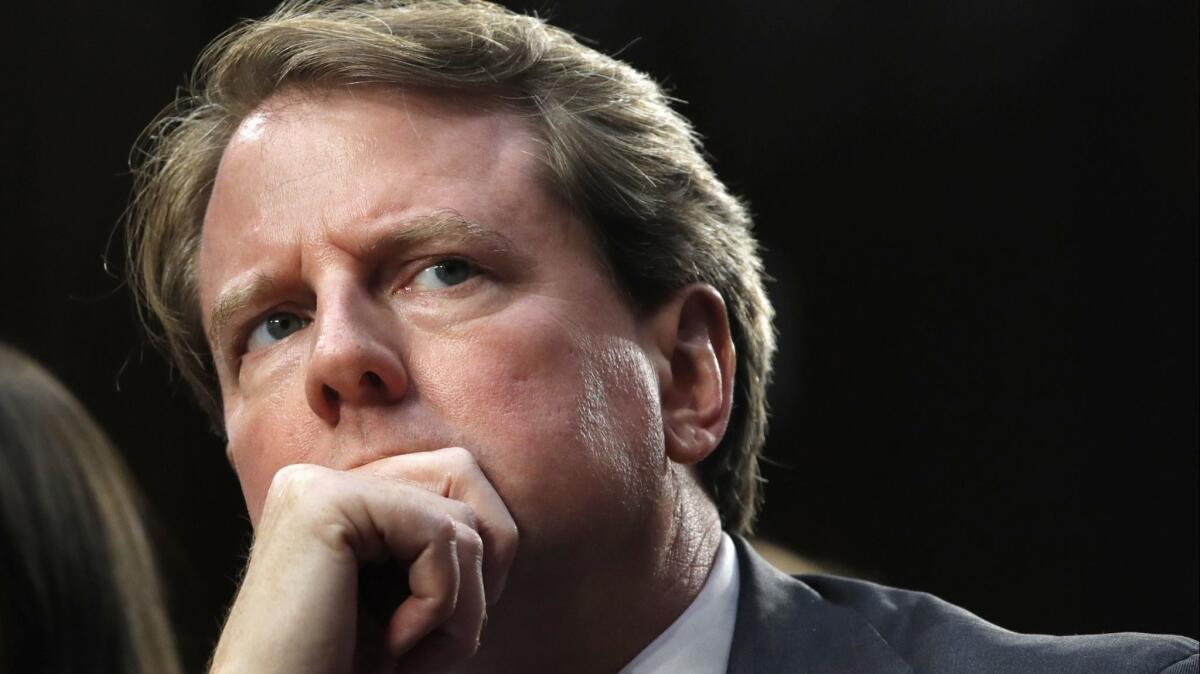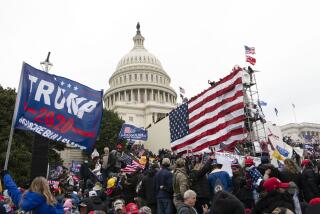In major win for Congress, judge rules Trump aides must testify

- Share via
WASHINGTON — A federal judge strengthened the power of Congress in its battles with President Trump on Monday, ruling that former White House Counsel Donald McGahn may be required to testify under oath about what he heard and saw during special counsel Robert S. Mueller III’s probe of Russian election meddling.
The judge’s decision upholding a congressional subpoena is a victory for House Democrats who have been anxious to establish a legal precedent that could force other top Trump administration officials to testify before Congress.
And although the case began as a result of the Mueller probe, it could have impact in the current impeachment proceedings against Trump. It sets the stage for what could be a historic court test of the president’s ability to prevent senior aides from testifying.
In her ruling, U.S. District Court Judge Ketanji Brown Jackson rejected Trump’s claim that McGahn was “absolutely immune” from being called to testify, even though he was no longer a White House employee. McGahn was following Trump’s order not to cooperate with House investigators.
“With respect to senior-level presidential aides, absolute immunity from compelled congressional process simply does not exist,” the judge wrote in a 120-page opinion. This claimed immunity “appears to be a fiction that has been fastidiously maintained over time through the force of sheer repetition” by lawyers for the current and previous administrations, she said.
“Stated simply, the primary takeaway from the past 250 years of recorded American history is that Presidents are not kings,” she wrote.
The ruling, if upheld on appeal, could affect a wide swath of senior officials. In addition to McGahn, House Democrats would like to obtain testimony from acting White House Chief of Staff Mick Mulvaney and former national security advisor John Bolton, among others.
While Jackson’s ruling doesn’t definitely answer the question of whether those other officials must testify, lawyers for the House are certain to cite it as a strong precedent. If the case reaches the Supreme Court while Trump’s impeachment is still pending, it could have a major impact on any impeachment trial in the Senate.
The judge, who was appointed by former President Obama, agreed there may be limits on what a White House official may disclose or discuss before Congress. If, for example, the president invoked executive privilege over certain topics, a subordinate might be barred from testifying about those.
But no such concern justifies ignoring or defying a subpoena entirely, she concluded.
“Compulsory appearance by dint of a subpoena is a legal construct, not a political one, and per the Constitution, no one is above the law,” she wrote. “However busy or essential a presidential aide might be, and whatever their proximity to sensitive domestic and national security projects, the president does not have the power to excuse him or her from taking an action that the law requires.”
House Judiciary Committee Chairman Rep. Jerrold Nadler (D-N.Y.) said in a statement that “now that the court has ruled,” he expected McGahn “to follow his legal obligations and promptly appear before the committee.”
Rep. Adam B. Schiff (D-Burbank), the chair of the House Intelligence Committee, similarly called the ruling a “significant victory.”
“The witnesses who have defied Congress at the behest of the president will have to decide whether their duty is to the country, or to a president who believes that he is above the law,” Schiff said.
McGahn’s attorney, William Burck, said his client would testify unless the judge’s order is stayed on appeal.
A Justice Department spokeswoman said the administration would appeal the ruling.
The White House said in a statement that the decision “contradicts long-standing legal precedent established by Administrations of both political parties. We will appeal and are confident that the important constitutional principle advanced by the Administration will be vindicated.”
Ordinarily, appeals courts can take months to consider a case, but given the pressing nature of the current impeachment proceedings, the judicial process could move much more quickly.
One key question will be whether the judge or the U.S. Court of Appeals for the District of Columbia Circuit will grant a stay to put Monday’s ruling on hold at least temporarily while that appeal moves forward.
The appeals court may not be favorable terrain for Trump. A majority of the judges are Democratic appointees. In recent weeks, those judges have ruled that the president’s accountants may be required to turn over his tax returns and financial records to a House oversight committee. Trump’s lawyers are now urging the Supreme Court to block that decision.
The Judiciary Committee has been eager to question McGahn about whether Trump obstructed Mueller’s investigation, including whether the president may have lied in written answers that he furnished to the special counsel.
The committee has also been looking at possible efforts by Trump to obstruct justice. According to Mueller’s report, Trump directed McGahn to tell the Justice Department to fire Mueller. McGahn refused to do so, and when Trump’s demand became public, the president told McGahn to lie about what Trump had asked him to do, the report said.
In his report, Mueller declined to say whether the president could be charged with obstruction of justice, in part because of a Justice Department ruling that sitting presidents can’t be indicted. But the Judiciary Committee could include attempts to obstruct justice as a count in an impeachment resolution.
In August, the committee filed suit seeking an order that would compel McGahn to testify. McGahn left the White House in October of last year and returned to the Jones Day law firm.
The legal dispute over the subpoena turned into a battle over history and the Constitution.
Two weeks ago, Atty. Gen. William Barr said the framers of the Constitution sought to create a strong and independent executive. He described the presidency as “one of the most successful features of the Constitution in protecting the liberties of the American people.”
“Unfortunately, over the past several decades, we have seen steady encroachment on presidential authority by other branches of government,” he said, referring to Congress and the judiciary.
By contrast, Judge Jackson said the Constitution was designed to put limits on the president’s power.
“The Constitution vests the legislature with the power to investigate abuses of official authority — when necessary to hold government officials, up to and including the President, accountable,” she wrote.
“What is missing from the Constitution’s framework as the Framers envisioned it is the President’s purported power to kneecap House investigations of Executive Branch operations by demanding that his senior-level aides breach their legal duty to respond to compelled congressional process.”
More to Read
Get the L.A. Times Politics newsletter
Deeply reported insights into legislation, politics and policy from Sacramento, Washington and beyond. In your inbox three times per week.
You may occasionally receive promotional content from the Los Angeles Times.











